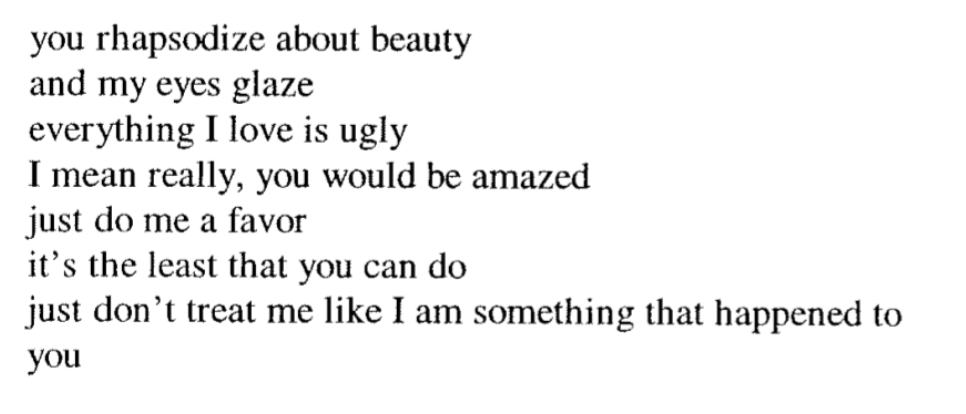Reading this out loud is surprisingly difficult, even for a native English speaker like myself. Of course, there are reasons why the language’s spelling and pronunciations can be completely arbitrary: many of the words have been inherited from other languages, with in turn their own messy rules on how to write and speak. I know that there have been efforts in the past to reform English — Daniel Webster’s American dictionary is responsible for why Americans don’t include a “u” in words like color and armor — but none have led to meaningful success. I was reminded of Anne Curzan’s paper on how Standardized English inevitably leads to a noticeable gap between those proficient in that particular dialect and those who are not, and I wondered if the same could be said about the very language itself. It may be worth it in the long run to make English a phonetic language, in the style of Spanish, for instance.
Commonplace 6
A Thousand Plateaus is a book about the link between capitalism and “schizoanalysis,” better known as nomadology: the tendency to cherry-pick and endorse certain ideas from political ideologies while leaving the rest behind. Part of Deleuze’s argument is that capitalism, and thus society at large, continues to exist in part because of our willingness to extol its positive virtues while downplaying its negatives. The quote in particular, however, is equally intriguing without this context. Ideas can be used to build upon others, and in turn be built upon. Alternatively, they can be discarded or ridiculed, but some may shatter a pre-existing notion of the world.
Commonplace 5

This is a photo from 1913 of the painting Ivan the Terrible and His Son Ivan on November 16, 1581 by Ilya Repin, after a modernist critic slashed at the canvas with a knife as protest for its artistic style. Although the painting was fully restored, and this was neither the vision of the artist nor the vandal, I like this version of the painting more than the original. The original shows the haunting image of the despotic Ivan the Terrible grieving over his son, who he accidentally beat to death during an argument – Russian audiences would have also been aware that, since his son was Ivan’s only sane heir, his death would put into motion the Time of Troubles, a period of civil war, invasion, and famine. In other words, Ivan the Terrible has not only killed his son, but doomed much of his kingdom to death. To me, the slashes represent his entire world falling apart.
Commonplace 4

Generating iDeas®.
“While most people believe that there can be an end to arguments based on the belief of objective reality , my essay will apply to Fish’s concept of a world where what we believe to be fact is based on our fallible perceptions, to show that people will always find themselves in argument in every single public medium.
Commonplace 3
A death poem found in David Hume’s Dialogues Concerning Natural Religion, which I read for a Problem of God class. This poem is recited by one of the characters as evidence for his case that there is no justice or mercy in the universe: death stands triumphant over the suffering masses, yet refuses to deliver the final coup de grace. I like the striking imagery, as well as how it is used in the wider context of the book. It makes a compelling argument that perhaps the only thing scarier than the prospect of death is to believe that death is purposefully extending your life for his own vanity.
Commonplace 2

I took a screenshot of this quote, which was from an article about conspiracy groups and how they function. The context for this in particular was a section in which the author wrote about how any conspiracy relies on linking disparate events together, to further suit the larger conspiratorial narrative. People instinctively try to find patterns, or narrative, in nature, whether they truly exist or not, which can lead us down a path of self delusion.
Commonplace 1

https://en.wikipedia.org/wiki/Haditha_Dam
The area was the site of a battle in the Iraq War, and the nearby village was the site of a massacre of civilians carried out by American troops. I think this tranquil overhead view has a stark contrast to the suffering on ground level.
“Put an end once for all to this discussion of what a good man should be, and be one.”–Meditations, Marcus Aurelius
This quote resonates with me, since it implies that we already know how to be a good person. It implies that good comes naturally, automatically, and that the only thing stopping us from living morally is ourselves. Stoicism gets a bad reputation for being dispassionate, but its quotes like these that prove that we can see goodness in the world without even looking for it.
The way she dances is hypnotic. I’m not a singer, dancer, nor a theater kid, and I only rarely listen to music, but watching the video is closer to watching a kite in the wind than an actual person dancing. If it’s possible to enter a trance on your own volition, I think this is excellent documentation on the part of Kate Bush.
